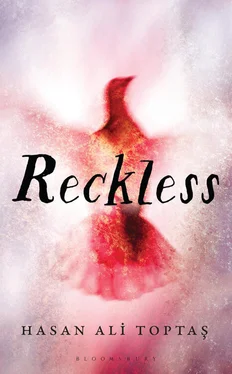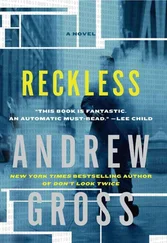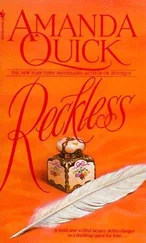Then he turned around and, keeping his eyes on the ground, looking at no one, he shuffled outside. Here he passed amongst the rifles that were laid out on the ground and made his way towards the almond trees, and sat down next to the barbed wire, turning his back to the children so that they couldn’t see him, and putting his head on his knees, he began to sob. Kenan came running out right behind him, but he couldn’t find a thing to say. Or rather, he shied away from saying anything, for fear of saying something that might make it even worse. Instead he waited seven or eight paces away, cigarette in hand, watching Ziya’s shoulders shaking as he kept his face down, and cried his heart out under the almond trees. When the sobs began to abate, just a little, he sat up straight, took out his cigarettes, and with trembling hands, he lit one. And that was when Kenan came over; without saying a word, without even asking if Ziya minded, he crouched down next to him. He had no idea what to say, anyway. There were so many things he wanted to say, so many words swirling through his mind, but he couldn’t find a way to extract enough of them for a sentence. That was why they didn’t speak for some time. They just sat there, smoking their cigarettes, and staring at the ground.
After a long while, Kenan said, ‘Don’t be upset. What’s done is done. There’s nothing we can do about it.’
‘How can I not be upset?’ said Ziya. He took a deep breath. ‘As you can see, every evil comes to find me. Yes, it’s true. Every evil comes to find me, and no matter how hard I try to stop it happening, I can’t. Honestly. I have no idea why this keeps happening. For God’s sake, Kenan. Tell me, please! Is there some sort of mark on me I can’t see? A cloud maybe? Or a light? Do I look the same as everyone else, when I’m seen from a distance? Or not? Please, could you tell me? Am I dressed in khaki right now, like you, and all our friends over there?’
Kenan looked shocked.
Measuring his words carefully, he murmured, ‘What a thing to say.’
‘I just don’t know,’ Ziya continued. ‘It’s something I have no power over. I just think there is some sort of sign on me, to guide all kinds of evil to me. It might even be a sign too small for the human eye to see, but as I just said, it could also be some sort of light, some sort of shadow.’
‘What a thing to say,’ said Kenan once again. ‘Are you serious, or is this a joke?’
‘Do I look like I’m in the mood for jokes?’ said Ziya. ‘I’m serious. I meant it.’
Kenan just stared at him, shocked.
Ziya looked as if he was about to cry again. His eyes sparkled with quivering tears.
When Kenan saw this, he said, ‘Just put those thoughts out of your head. Why don’t we get up now? That’s what I think we should do. We have to go back to the mess hall now and take the pots to the kitchen, as you know. That fool of a mess sergeant is waiting for us to come back, and the last thing we want is another bust-up. So come on now. Get up!’
Reluctantly stubbing out his cigarette, Ziya slowly rose to his feet.
By the time they reached the mess hall, the others on mess duty had long since rolled up their sleeves to clear the tables. Kenan and Ziya joined them at once, and together they carried the pots to the kitchen, down the dirt road that ran alongside the water depot.
‘This will be the last time we see the kitchen,’ said Kenan, hoping to console his friend. ‘It’s our last stint. Two more weeks and we’ll be out of here.’
Ziya said nothing. Weighed down with all those pots, he could do no more than give Kenan a sidelong look. But then he turned to the left, to look at the Koçaş mountains and the clumps of undergrowth between them and, very slowly, he breathed in.
In the kitchen, Ziya remained silent. From the soulless way he washed the trays from the officers’ mess, you might have thought him a machine. Just then, one of the men doing the rinsing announced in a voice as bright and cheerful as running water that they would be doing the lottery that weekend. He went on to say that his source was solid. Looking over his shoulder so that he could look the others in the eye, he said, ‘There’s a sergeant at headquarters who comes from my part of the country. He was the one who told me.’
Hearing the words that spelled the end of their training, they all perked up, of course. And then there was a short silence, a tense silence that flashed and glittered like those trays from the officers’ mess, as each one of them wondered where in the country he might be sent next. And then someone said that anyone from a rich family was bound to get preferential treatment and there followed a heated argument in that dim-lit kitchen that stank of oil and detergent. According to some, this piece of shit farce they called the lottery was a scam, pure and simple; they did it only so that they could say they had. ‘No sir! That’s not true,’ said others. There was no preferential treatment. They folded up those papers and put them into sacks or metal pots and then those lots were duly drawn in full view of the entire company, and so it was total nonsense to say that there was any trickery going on, because they would each be choosing their lot with their own hands, and that was why they would, in due course, each accept their fate. It was wrong to accuse the army — the pride of the nation — of resorting to preferential treatment, or trickery, and suspicious practices of any kind, without any proof; the lottery would be just, no doubt about that, because there was no difference between rich and poor here: beneath their khaki uniforms, they were all equal.
But that is not how things turned out on the day. The ones who had, despite never once going beyond the barbed wire in all their time there, managed to have their uniforms altered for them on their second day, the ones who had spurted more money than a fountain does water, and managed to get through without a single sergeant kicking them; the ones the loudspeakers were forever calling to headquarters, if not to collect a doctor’s report, then to speak to their families on the phone, and who spent weeks lolling about the dormitory, watching the training ground through the window — somehow they all made it to the lottery, and somehow they all ended up with papers that said Gökçeada, Bergama, Istanbul, Akçakoca, Denizli or Izmir. Ziya’s paper said Urfa. Kenan went next. He put his hand into the black bag the sergeant was holding, pulled out a paper, and as soon as he had read it, he turned to Ziya. ‘Look,’ he said, in a strange but happy voice. ‘I got Urfa too.’
For three months they had lived on the outskirts of Silvan, and never once had they seen the town. And the very next day, a big bus pulled up outside the guardhouse, to take thirty-five men off to Urfa, with the sergeant in tow.
As the bus pulled away, Ziya murmured, ‘Did you see that? We didn’t say goodbye to Şehmuz.’
‘And who’s Şehmuz?’ asked Kenan.
‘The boy from Silvan. The boy at the barbed wire,’ Ziya said softly. He took a deep breath. ‘You know, the boy we bought our boiled eggs and green onions from.’
Remembering him now, Kenan nodded gently.
‘We didn’t say goodbye,’ said Ziya once again. ‘After eating so much of his food. Shame on us.’
With that he turned back to the window and for a long time, as the rocky land slipped past, he thought only about Şehmuz. He thought about him for so long that he could almost see him standing there on the other side of the barbed wire, shimmering in the wind and stretching out his little arms, his little black eyes receding into love.
It was sunset by the time they reached the 123rd Mobile Gendarmerie Unit in Urfa. There was no time to get a sense of where they were. They spent a tense night in a large, grey-curtained dormitory that stank of sour sweat and strangers.
Читать дальше












